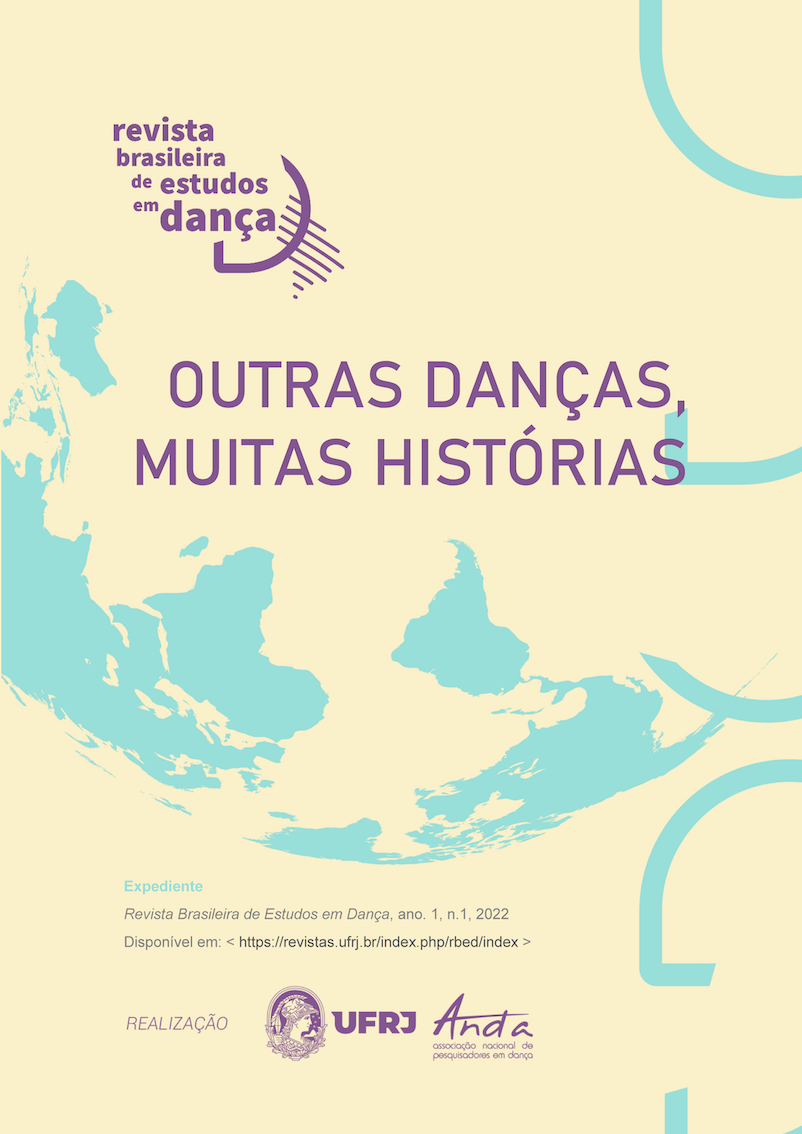Rituals of the unknown:
Performative improvisation in southern collections
DOI:
https://doi.org/10.58786/rbed.2022.v1.n1.52278Keywords:
Improvisaçao, Performance, Festa, Baile, Estética decolonial, Saber popularAbstract
Improvisation as a performative arts practice responds to contexts and images in real time, being experienced and named in a village-specific way. In the manifestations of the peoples of the South who have been marginalised by the hegemonic discourse of modern art, it is a practice that is both powerful and invisible. We see how countless Latin American performative practices of great vitality develop knowledge and strategies for improvisation. What is the place and how do these devices of knowledge operate? Can they be considered collective devices for the production of social reality? Do these devices of collective creation, of visual, oral and performative narratives have the capacity to question modern and postmodern ideas of art and aesthetics? We conclude that these practices and the broad reflection on them make possible the restoration of collective experiences, in a wider field, as strategies operating in everyday life and the emergence of different registers of reality that popular performances mobilise.
Downloads
References
BAPTISTE, Andrien (Editeur). De l’un à l’autre. Composer, Apprendre et partager en mouvements. Bruselas: Contredanse editorial, 2010.
CHILLEMI, Aurelia. Movimiento poético del encuentro. Danza comunitaria y desarrollo social. Ediciones Artes escénicas. Buenos Aires, 2015
CONTAC QUATERLY. Dance and improvisation Journal. 1978-2022. Artículos en línea disponibles en: https://contactquarterly.com/index.php. Acceso en 13 agosto de 2021.
COSTA, Rogerio. Orquestra Errante: Improvising Assemblages Facing the Authoritarian Assemblage. In Paulo de Assis and Paolo Giudici, Machinic Assemblages of Desire Deleuze and Artistic Research 3. Leuven: Leuven University Press. 2021. Disponible en:
https://www.academia.edu/45372493/Orquestra_Errante_Improvising_Assemblages_Facing_the_Authoritarian_Assemblage. Acceso en 25 abril de 2021.
DUSSEL, Enrique. Siete hipótesis para una estética de la liberación, Revista ASTRAGALO, n° 24. Pgs 13-40. 2018. Disponible en:
https://dialnet.unirioja.es/descarga/articulo/7026999.pdf. Acceso en 13 octubre de 2020.
FEDERICCI, Silvia. Caliban y la bruja. Mujeres cuerpo y acumulación originaria. Madrid: Editorial Traficantes de sueños. 2004. Disponible en:
https://traficantes.net/libros/calib%C3%A1n-y-la-bruja. Acceso en 10 de agosto de 2010.
GINOT, Isabelle. Du piéton ordinaire. En Briand Michel (Dir) Corps (In)croyables Pratiques amateur en danse contemporaine. PARIS : CND. p25-44.
GONZÁLEZ, Manuel. La práctica improvisatoria en la música popular latinoamericana. Revista Arte e Investigación (N.° 11) pp. 59-66, noviembre 2015. Disponible en:
http://sedici.unlp.edu.ar/bitstream/handle/10915/51579/Documento_completo__.pdf?sequence=1&isAllowed=y. Acceso en 2 abril de 2018.
GRAU, Andrée et WIERRE-GORE G. (Org.) Anthropologie de la danse. Genèse et construction d’une discipline, Paris : CND. 2020 (2005).
GUERRA, Ramiro. Calibán danzante. Caracas: Monte Ávila Editores Latinoamericana-CONAC, 1993.
KANT, Inmanuel. Crítica del juicio seguida de las observaciones sobre el asentimiento de Lo bello y lo sublime. Biblioteca virtual gratuita. 1790. Disponible en: https://onemorelibrary.com/index.php/es/?option=com_djclassifieds&format=raw&view=download&task=download&fid=7536. Acceso en 15 octubre de 2021.
KUYPERS, Patricia. Introducción al número especial Danse Nomade. Revista Nouvelles de Danse, n°34/35. Bruselas: Contradanse. 1998.
MANARA, Bruno. María Lionza. Su entidad, su culto y su cosmovisión anexa. Caracas: Dirección de cultura de la UCV., 1995.
Mandoki, Katya. El indispensable exceso de la estética, Siglo XXI, México, 2013.
PEREZ-WILKE, Inés. La experiencia de l@s Otr@s. Claves para una heterología Suramericana. 2016. 285pgs. Tesis. Doctorado en Ciencias del Desarrollo estratégico, Línea de investigación en Interculturalidad. Universidad Bolivariana de Venezuela. Caracas, 2016. Disponible en:
https://www.academia.edu/27663039/LA_EXPERIENCIA_DE_L_at_S_OTR_at_S_Claves_para_una_heterolog%C3%ADa_suramericana_Tesis_doctoral_Menci%C3%B3n_Publicaci%C3%B3n. Acceso en 12 de mayo de 2021.
PEREZ-WILKE, Inés. PENSAMIENTO SENSIBLE Principios de improvisación colectiva. Conferencia presentada en Las Jornadas Internacionales de educación en Artes JART-UEMS, en la Universidad Estadual de Matto Grosso du Sul.
PEREZ WILKE, Inés. Dispositivos de la sensibilidad: Para una tecnología de la experiencia estética. Calle 14: revista de investigación en el campo del arte, Bogotá: n° 16. pp. 146-161. 2021. Disponible en:
https://revistas.udistrital.edu.co/index.php/c14/article/view/17409/16485. Acceso en 10 de abril de 2022.
PRANDI, Reginando. Mitología dos Orixas. Sao Paulo: Companhia das letras, 2007.
Real Academia española. DRAE en línea.
RICHARDS, Thomas. The edge-point of performance. Pontedera: Workcenter Jerzy Grotowsky. 1997.
ROLNIK, Suely. Esferas de la Insurrección. Buenos Aires: Tinta Limón.2019.
VELÁSQUEZ, Ronny. Los Akawaio: indígenas del Esequibo, Territorio en Reclamación. Caracas: CNU-OPSU. 2010.
Published
Versions
- 2024-05-10 (4)
- 2023-12-01 (3)
- 2023-11-30 (2)
- 2022-07-15 (1)
How to Cite
Issue
Section
License
Authors who publish in the Revista Brasileira de Estudos em Dança are
responsible for the content of signed articles and retain copyright.
They grant the journal the right of first publication with the work simultaneously
licensed under the Creative Commons Attribution-NonCommercial 4.0 License
(Open Archives Initiative - OAI). This feature, used for open-access journals,
allows sharing work for non-commercial purposes and acknowledges
authorship. If the text is later published in another vehicle, the author
must inform that it was initially published as an article in the Revista Brasileira
de Estudos em Dança. Therefore, even if the journal owns the first publication,
authors are entitled to publish their work in institutional repositories or on
their personal pages, even if the editorial process has not been completed.
The journal reserves the right to make normative, orthographic, and grammatical changes to maintain the language standard, respecting the authorial style.

